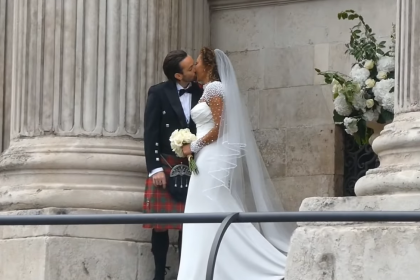 Patricia Rivers-Gilbert has a warm, engaging smile and a sunny disposition. Rivers-Gilbert, a fitness buff, doesn’t look like she’s been in a battle for her life with a formidable enemy, but she has. The statuesque clinical social worker was diagnosed with breast cancer in March of 2007. She’d had a lumpectomy in 1995, and although the lump was benign, her doctor suggested she begin having mammograms on a yearly basis.
Patricia Rivers-Gilbert has a warm, engaging smile and a sunny disposition. Rivers-Gilbert, a fitness buff, doesn’t look like she’s been in a battle for her life with a formidable enemy, but she has. The statuesque clinical social worker was diagnosed with breast cancer in March of 2007. She’d had a lumpectomy in 1995, and although the lump was benign, her doctor suggested she begin having mammograms on a yearly basis.
In October 2006, Rivers-Gilbert had her annual mammogram and received a clean bill of health. A month later, she saw a really small spot of blood on her bra. She dismissed it as a scratch and didn’t give it another thought.
“But in January, I [saw the blood] again, which made me more alarmed and I thought, ‘this is unusual.’ So that made me start squeezing my nipple because it wasn’t where you would think it would be in your bra — it was up at the top. So I squeezed my nipple really, really hard [and] a good amount of blood came out, so I called my doctor,” says Rivers-Gilbert.
Rivers-Gilbert’s immediately made an appointment with her doctor, who suctioned her breast and extracted a large amount of blood also. The doctor sent a sample to the lab and scheduled a ductography, a biopsy of the milk duct. Five days later, the results came back and the doctor delivered the devastating diagnosis: Rivers-Gilbert had ductal carcinoma in situ (DCIS). Rivers-Gilbert was thunderstruck.
“And it really didn’t register, I was just listening,” says Rivers-Gilbert of her reaction to the doctor’s pronouncement. So I said, ‘OK’ because I knew she had done the ductography and was talking about that. So she looked at me and I said, ‘What else is going on?’ And at the same time my husband was with me and he was reading a poster about ductal carcinoma in situ. So that’s when I realized it was cancer and I asked her if it was cancer and she said, ‘Yes.’ So that just changed everything.”
But after being diagnosed with stage 0 breast cancer, the earliest point at which breast cancer can be detected, Rivers-Gilbert didn’t put a drop of energy into feeling sorry for herself.
“Being a social worker, after [I got the news] I started problem solving, thinking ‘OK what’s the next step?’ What do I have to do? What kind of surgery do I have to have? And [the doctor] said, ‘We’re not doing anything right now. Just go home and take all of this information in.’ And she kept telling me how fortunate and blessed I was because a lot of women would have ignored [the blood],” says Rivers-Gilbert of the small spot of blood on her bra that spurred her visit to the doctor.
Rivers-Gilbert’s doctor urged her to be tested for mutations of the BRCA1, BRCA2 gene. Women who have mutations of those genes are predisposed to developing breast and ovarian cancer.
“I did the BRCA1, BRCA2 testing and then I did the bilateral MRI, and on that it did show the cancer in the duct. But the thing was that once we decided the course of treatment — then I would have to do radiation, but I wouldn’t have to do chemo,” says Rivers-Gilbert, who did not have the genetic mutation.
Rivers-Gilbert underwent a partial mastectomy on a Wednesday and went to her plastic surgeon the following Monday. But, cancer was found in a different duct in her right breast before she could undergo reconstruction. As a matter of fact, she was on her way to the plastic surgeon’s office when her doctor called with the news.
“So I clearly remember when I was going back for my follow-up with the surgeon, Dr. Rogsbert Phillips’ office called. She doesn’t like to talk to you over the phone and when her office called [they said] she wants you to come in. I said, ‘well, I have an appointment with the surgeon for my follow-up and I can’t come all the way out there. Tell her she needs to call me’ and that’s [when the doctor got on the phone]. She said, ‘I know you didn’t want to do this, but we’re going to have to do another surgery and we’re doing the total mastectomy. But the good news — if anything — is that we don’t have to do the radiation if we do the total mastectomy,’ ” recalls Rivers-Gilbert of the conversation.
“The way I had to look at it to get through it was that I had to make lemonade out of lemons. I was a double D and I said, ‘now I [can] get that reduction I wanted. I can wear tops that I couldn’t wear before.’ Just trying to make this a positive, once I was able to wrap my mind around having the second surgery and that the cancer was in a different duct, I said, ‘OK, but I don’t have to have radiation,’ ” she says.
Rivers-Gilbert implores all women to “really pay attention to our bodies, because our bodies give us signals and we have to pay attention and do something about it. Do the follow-up with our doctors to find out what our bodies are trying to tell us.”
Rivers-Gilbert has a Zen-like approach to life now. “I look at what is really important, and for me, I got rid of stressful things in my life. I live in the moment and I’m thankful for the little things. I’m on other side now, I’m a breast cancer survivor,” she says triumphantly. –michele fling










